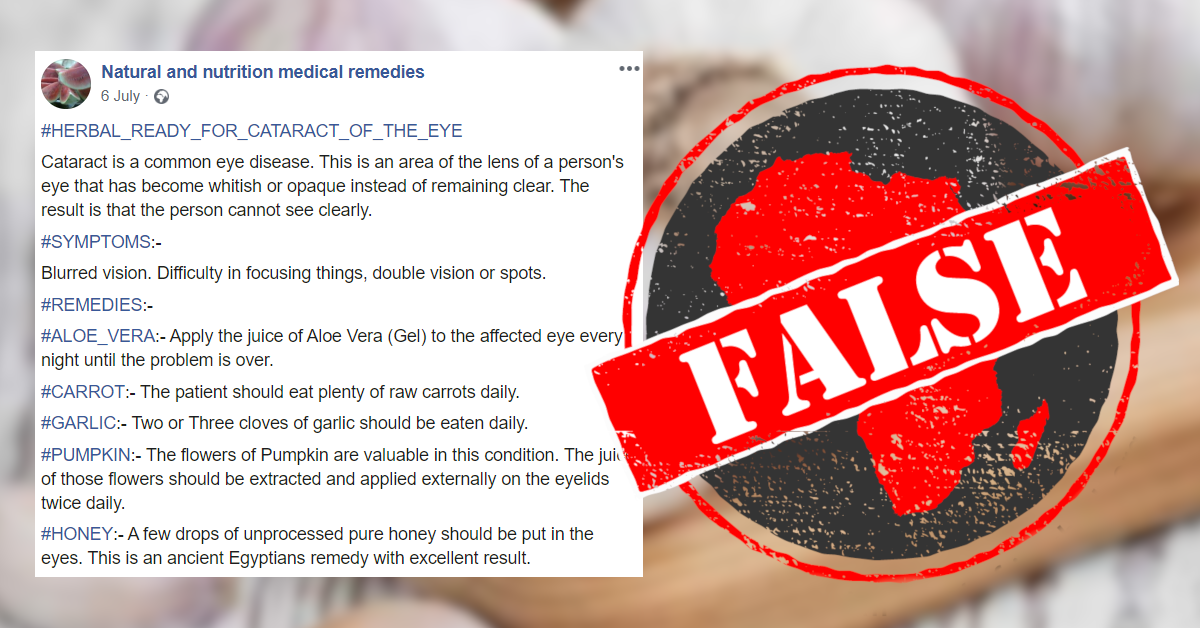A Facebook post shared in Nigeria in July 2019 claims that a variety of plants and foods can be used to treat cataracts.
But an expert warns that putting unproven remedies in your eyes could cause more damage.
A cataract is a clouding of the lens of the eye, which makes it difficult to see clearly. It causes a person’s vision to become blurry, foggy or filmy, and usually affects older people.
The post gives different directions for five different ingredients. It advises people to “apply the juice of aloe vera (gel) to the affected eye every night until the problem is over”, eat “plenty of raw carrots” and “two or three cloves of garlic” daily and extract the juice of pumpkin flowers and apply this “externally on the eyelids twice daily”.
The final instruction is to put “a few drops of unprocessed honey” in the eyes.
Would these treatments remove cataracts?

Africa Check asked Prof Lawan Abdu, an ophthalmologist at Bayero University, Kano in northwestern Nigeria, about the claim.
“I have no knowledge of such treatment. Cataracts, in most cases, appear as one gets older. Any other case will be due to an infection. The only solution to it is surgery,” Abdu said.
“People should stay away from putting substances that are not scientifically proven into their eyes, especially when it has to do with an eye issue. These things can cause more damage.” – Jennifer Ojugbeli
But an expert warns that putting unproven remedies in your eyes could cause more damage.
A cataract is a clouding of the lens of the eye, which makes it difficult to see clearly. It causes a person’s vision to become blurry, foggy or filmy, and usually affects older people.
The post gives different directions for five different ingredients. It advises people to “apply the juice of aloe vera (gel) to the affected eye every night until the problem is over”, eat “plenty of raw carrots” and “two or three cloves of garlic” daily and extract the juice of pumpkin flowers and apply this “externally on the eyelids twice daily”.
The final instruction is to put “a few drops of unprocessed honey” in the eyes.
Would these treatments remove cataracts?

Only treatment for cataracts is surgery
Africa Check asked Prof Lawan Abdu, an ophthalmologist at Bayero University, Kano in northwestern Nigeria, about the claim.
“I have no knowledge of such treatment. Cataracts, in most cases, appear as one gets older. Any other case will be due to an infection. The only solution to it is surgery,” Abdu said.
“People should stay away from putting substances that are not scientifically proven into their eyes, especially when it has to do with an eye issue. These things can cause more damage.” – Jennifer Ojugbeli
Republish our content for free
For publishers: what to do if your post is rated false
A fact-checker has rated your Facebook or Instagram post as “false”, “altered”, “partly false” or “missing context”. This could have serious consequences. What do you do?
Click on our guide for the steps you should follow.
Publishers guideAfrica Check teams up with Facebook
Africa Check is a partner in Meta's third-party fact-checking programme to help stop the spread of false information on social media.
The content we rate as “false” will be downgraded on Facebook and Instagram. This means fewer people will see it.
You can also help identify false information on Facebook. This guide explains how.





Add new comment